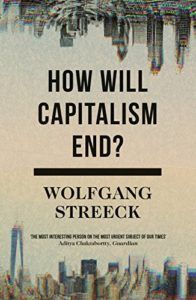
Photograph by Nathaniel St. Clair
Sociation by consumption
Wolfgang Streeck, author of How will capitalism end? [2016], provides us with a compelling and provocative analysis of how capitalism, slammed against the ropes and almost down for the count of ten, found a way out of its dilemmas of the 1970s. The market was saturated and the labour movement was pressing for more say and higher wages. The old Fordist regime of standardized, often boring products was nearing its end. So was the idea of the “empowered worker.” Soon, the customer would be paid more attention than ever. In fact, a revolution of the “commercialization of social life that aimed to save capitalism from the spectre of saturated markets after the watershed years” was underway.
Was it ever! The capitalists learned in the 1970s to put the “individualization of both customers and products at the service of commercial expansion.” The golden key that unlocked the Neo-liberal revolution was “diversified consumption.” Streeck defines this concept as follows: “Commercialized diversification—the movement of markets and commercial relations from the satisfaction of needs to the servicing of wants—extended far beyond automobiles.” Tying the purchasing of newly diversified products—luxury goods, from perfumes to watches—to a new form of stylized personal identity, production soared.
Niche production enabled consumers to purchase specially diversified goods, from golf clubs to cars. Even McDonald’s discovered local cuisine. And vintners suddenly invented endless new wines for exquisite consumption (on a balcony overlooking the Mediterranean of course). Streeck informs us that two German firms, Adidas and Puma, turned themselves into multi-billion-dollar global companies selling hundreds of ever changing running shoes to perfumes for men and women. We were all at the mercy of capitalist seduction. With obsolescence built into the commodities, all that glitters was available at the tap of a key.
Now, individuals were integrated into society with few obligations. In a mature, affluent market “buying something involves no more than picking what you like best (and can afford) from what is in principle an infinite menu of alternatives awaiting your decision, with no need to negotiate or compromise as one had to in traditional social relations.” This, says Streeck, is “sociation by consumption.” Describing it as “monological rather than dialogical in nature, voluntary rather than obligatory, individual rather than collective. It is from this perspective that it seems  productive to speak of a particular politics of consumption, associated with the affluent societies of today.” In this high intensity consumer paradise, individuals can exit all forms of “collective identity”—traditional religious communities, neighbourhoods, even one’s nation. Thus, Streeck argues powerfully that participating in a “community of consumption,” with its looser ties that bind, allows individuals to “surf from one identity to the next, free from any pressure to explain themselves.” Live lightly, flit about freely.
productive to speak of a particular politics of consumption, associated with the affluent societies of today.” In this high intensity consumer paradise, individuals can exit all forms of “collective identity”—traditional religious communities, neighbourhoods, even one’s nation. Thus, Streeck argues powerfully that participating in a “community of consumption,” with its looser ties that bind, allows individuals to “surf from one identity to the next, free from any pressure to explain themselves.” Live lightly, flit about freely.
“Sociation by social media—Twitter, Facebook and the like—represents an extension of this trend, not least in that it offers these companies a further set of tools for highly individualized marketing.” Shoshana Zuboff’s new, massive, flawed, controversial book, The age of surveillance (2018) uncovers endless examples of illegal access to our private consuming profile, just to anticipate and shape what we might buy. This Zuboff calls the “extractive economy.” Read Zuboff, exit from Facebook promptly.
Marketized public sphere
Licking their lips, firms and politicians seized a fantastic opportunity to use the new technologies to “compensate for the increasing atrophy of traditional party organizations.” Capitalism rescued itself from late-Fordist stagnation. But this, as we have seen, led to the “unprecedented commercialization of social life…”. This process, however, transformed the “nature of politics as such.” The driving spirit of commercialization is viewing the world as one’s oyster (What’s in it for me?) and not whether everyone even has enough bread to eat (Do we all have enough to eat?). The narcissistic preoccupation with self-expression and affirmation easily accommodates itself to the dizzying world of the social media. There, one can hook up with sites that simply confirm one’s own biases. One may never engage thinking that upsets one’s own narrow angle on the world. There’s something for every taste, from bomb-building to growing orchids.
Streeck tells us that, since states now exist alongside dynamic, new markets for advanced consumption, they aid investment capital’s desire for the “privatization of several hitherto publicly provided services, among them tele-communications, radio broadcasting and television, which increasingly came to be perceived in their traditional format as old-fashioned, utilitarian, boring, and unresponsive to users-turned-consumers.” Now, the idea was that only sexy private firms could deliver the snazzy customized products. The newly privatized sectors of telecommunications and television made huge fortunes (Murdoch and Berlusconi for example). There had only been two channels for Germans through the 1970s. By contrast, Streeck informs us, today there are cities in Germany where one receive over a 100 channels. The old channels are less entertaining, and national networks (in the US and elsewhere) were “relegated to a small niche in a highly fragmented media market, almost entirely geared towards entertainment.”
Streeck points out that the “received political wisdom during the 1980s and 1990s [was] that the difference between public and private provision was that the state dictates to people what they are supposed to need—which will always in effect be the same for everybody—whereas private markets cater to what people really want, as individuals.” Here, it should not surprise us that this attitude—private enterprise can deliver the sparkling goods—infiltrated government activity, which could be “outsourced to the market.”
Now, citizens were pressured to convert their old attitudes as citizens to perceiving themselves as customers. And state officials were taught not to act as “representatives of the law, of legitimate public authority or of the general will, but on the pretense that they were providers of services in a competitive marketplace, driven simultaneously by the desires of their customers and the pressures of competition.”
The new “politics of consumption” has eroded the public sphere. Judged as shabby and dull, public provision was demeaned—at great cost. While satisfying “expectations of diversity, individuality and choice may increase the legitimacy of the delivery of certain goods and services by governments rather than by commercial firms, it may be quite subversive when it comes to the production of such goods, in particular where it involves duties of citizenship, including the collective deliberation of how entitlements and duties can be weighed.”
At stake in Streeck’s subtle argument is that there are “collective goods which are indivisible and must be produced, or at least decided upon, by those who benefit from them, and indeed by their collectivity: social solidarity, distributive justice and the general rights and duties that constitute citizenship.” In other words, we must not judge these “public goods” by the same standards as modern commodities.
Streeck offers us some excellent counsel. For one thing, one cannot measure citizenship by the same criteria as customership. In fact, if we do so, citizenship will look “structurally similar” to the mass markets of by-gone days. Secondly, rather than merely “consuming political decisions, citizens in a functioning democracy are invited and indeed obliged to participate in their production.” This requires a third element: namely, the willingness to subject “raw” collective wants to “critical scrutiny in some sort of public dialogue.” Streeck accentuates a salient ingredient of “active citizenship”—a “disciplined readiness to accept decisions that one had originally opposed, or that are contrary to one’s interest.” Although the individual might not get his or her way, they can be “compensated by civic satisfaction,” “achieved through a legitimate democratic procedure.”
Thus, Streeck insists that “political participation” can not travel the customership rail line. Rather, it demands “a preparedness to justify and recalibrate one’s choices in the light of general principles, developing preferences not in the sense of diversifying, but rather of aggregating and unifying them. Moreover, unlike customership, citizenship demands that one provide generalized support to the community as a whole, in particular by paying taxes, which may be put to as yet undecided uses by a lawfully constituted government, as distinguished from purchases of specific goods or services paid for one at a time, at market prices.”
Once citizens become customers from head to toe, the possibility of the “production of civic goods will dry up, which in turn will undermine the capacity of the state to produce the civic goods on which the legitimacy of politics as politic depends.” Already—is this not true?—the combination of brutal Neo-liberal cuts to the public sector and the permeation of the ideology of customership has seriously eroded public discourse and the vitality of public spheres. The poor and lowly have little opportunity for solutions to their distress as the very rich exit from concern for the collective interest. Why would the very rich elites of Nigeria invest in public trains when they can use their private jets to flit around?